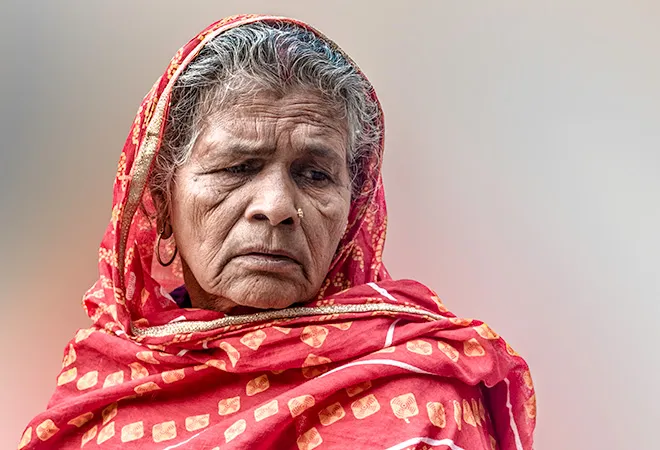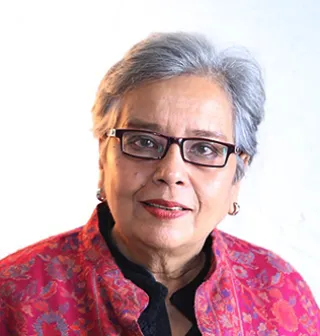-
CENTRES
Progammes & Centres
Location
Despite the demographic dividend and young population, whose median age is 27.1 — India is getting old before it is getting rich.

Image Source: Ashish Kumar — © iStock/Getty Images
India is going through a serious economic slowdown. In the course of the next few months, this will lead to job cuts and shutting down of factories. Many steps have been taken by the Government to reverse the slowdown and push up demand which will lead to higher GDP growth. So far, the results have not been very visible on the job creation front or in boosting flagging demand, and unemployment is at its highest in decades.
Unless something quick and drastic is done for the economy, there will be deep repercussions on society and directly or indirectly, all will suffer. It is the working population which supports children and the elderly in India and in other countries. If they are out of jobs, there will be stress at home and the dependents, specially the elderly, will suffer. Every so often, there are reports in newspapers about elderly parents being mistreated by their children as looking after dependent parents is low priority compared to educating children, when income sources dry up. On the other hand, there are also cases where the children have given up their jobs to care for elderly parents with serious diseases. In both cases, there is need for government intervention that will relieve the plight of the elderly.
The situation faced by the elderly (60 years and above) is comparatively worse in India because they often cannot earn any income and are dependent on family members for their upkeep and welfare. Their savings which go towards acquiring a house or flat is often passed on to the sons and daughters in old age and from which they are sometimes dispossessed. This is because breakup of the nuclear families due to modernisation and urbanisation has led to elderly parents being forced to live in smaller households with their children, which is far from comfortable. In many cases, without any means to support them in the future, their last years are spent in misery.
Unlike in the Western countries, the elderly population in India mostly stays with the family than on their own. Single elderly people staying on their own is only 2.2 per cent of the population while as old couples living on their own, it is 10 per cent of the population. Nearly 87.8 per cent of the elderly population are living with their children. By contrast, it is common to see old ladies and men or couples living alone in the Western countries and they manage to cater to all their needs without much help and support. Physically they are more fit and active. With proper healthcare in developed countries, they are in good shape with preventive checkups and other kinds of help rendered by their health services that are useful to keep the elderly active, like physiotherapy. In India, family still remains the mainstay for the elderly and as they get older and weaker, their dependency grows further.
In India — which has one of the weakest social security in the world — care for the elderly is missing to a huge extent. Only around 70 per cent of the population has any form of social security. Economic independence of older population is the key indicator of their well being. Only 26.3 per cent are financially independent and 20.3 per cent are partially dependent on others, but 53.4 per cent or the majority of elderly population is entirely dependent on children for economic security. Lack of affordable old age homes, where people can live independently, is also a problem. The fancy ones are too expensive and beyond the reach of an average Indian person from the middle classes.
People forget that despite the demographic dividend and young population, whose median age is 27.1, India is getting old before it is getting rich. Falling fertility rate has led to faster ageing in India than before. According to a study, Economic Independence and Social Security among India’s Elderly, by Srinivas Goli, Bheemeshwar Reddy A., K.S. James and Venkatesh Srinivasan (Economic and Political Weekly, 28 September 2019), there are many aspects of ageing in India that need to be looked at carefully and remedial action is needed to lessen the burden on the ageing population. They point out that due to the decline in fertility rate in India, there has been a rapid structural transition in the age composition of the population. This has resulted in an accelerated rise in the proportion of older people. There were 103.4 million elderly in 2011. Some States have more old people than others, but on average, they comprise around 10 per cent of the population. This will reach 15 per cent by 2040 when the bulge in the working population starts to shrink.
Care for the elderly varies from State to State. The State pensions under various schemes are a pittance in most cases. As many as 17 States are giving less than Rs 1,000 a month as old age pension with a minimum contribution from the State budgets. The ageing population of India is living without dignity and is also afflicted by various disabilities due to poor nutrition and healthcare.
There is need for a more generous old age pension for the elderly from the State. There is also a need to build more and affordable old age homes where they can live independently. Better healthcare, specialised in geriatrics, is needed. Many of the older generation who can still work should be given alternate employment opportunities which will lead to less mental health issues.
Elderly women are more vulnerable than men to abuse from the family. Special protection should be granted to them.
Income tax rebates and higher interest rates on savings for senior citizens are also important for guaranteeing financial security. Other schemes giving relief to the elderly in their travel by the railways and airlines are important for making their lives more interesting and varied.
There is also need for universal health insurance for the elderly which is being covered partially by the AYUSHMAN Bharat. There is need for social workers to visit people suffering from loneliness and depression and help them get on with their daily chores like bathing, exercise and cooking. Some good work is being done by NGOs like HelpAge India. The requirements are, however, enormous.
The views expressed above belong to the author(s). ORF research and analyses now available on Telegram! Click here to access our curated content — blogs, longforms and interviews.

Jayshree Sengupta was a Senior Fellow (Associate) with ORF's Economy and Growth Programme. Her work focuses on the Indian economy and development, regional cooperation related ...
Read More +